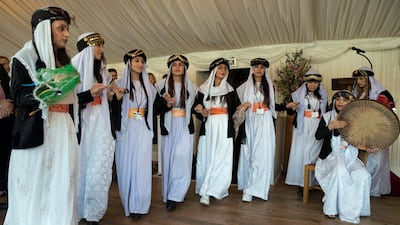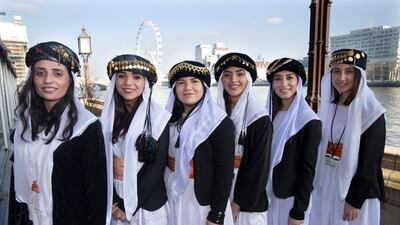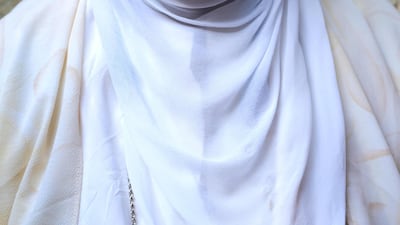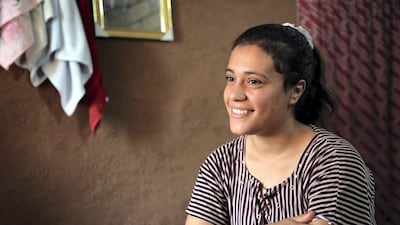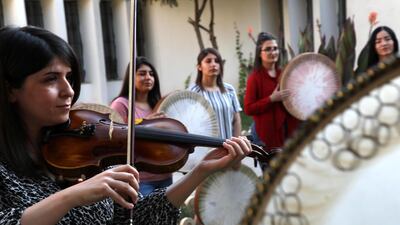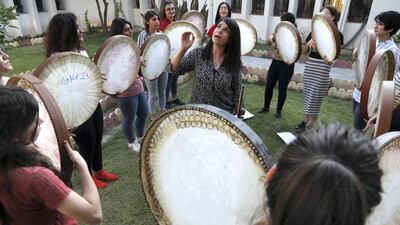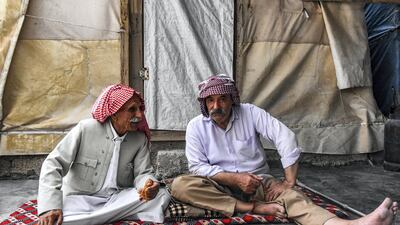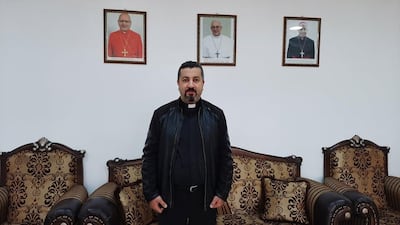Pope Francis's message of tolerance and coexistence in Iraq is welcome but justice and accountability is needed in order to safeguard religious freedom in Iraq, said a coalition of rights groups led by Nobel Peace Prize laureate Nadia Murad.
Ms Murad, an Iraqi Yazidi survivor of ISIS, signed the open letter alongside 34 NGOs that raise awareness of crimes against humanity and victims of sexual violence during wartime. In this context, the coalition of NGOs welcomed Pope Francis’s visit to Iraq.
"We welcome the efforts already taken to safeguard religious freedom in Iraq, such as the Interfaith Statement on the Victims of ISIS endorsed by religious leaders from the Christian, Sunni, Shia, and Yazidi communities" the letter said.
“However, without justice and accountability for past atrocities, religious communities will continue to face persecution and the threat of repeated violence.”
The letter calls for greater efforts by the government to educate Iraqis about different minorities in the country, hoping that the semi-autonomous Kurdish Regional Government and the federal government in Baghdad can co-ordinate more effectively to protect minorities.
"The Christian population has been reduced to a mere 300,000 today," it said.
“Other minority communities such as Yazidis, Sabean-Mandaeans, Turkmen, Kakais, and Shabaks have faced existential threats in recent years.”
Ms Murad is from Iraq's small Yazidi minority, who were ruthlessly targeted by ISIS in what the UN has deemed a genocide. Yazidi men were murdered while as many as 6,000 Yazidi women and girls were taken away as slaves for ISIS fighters, suffering sexual violence.
The call shone a spotlight on the conditions that minorities continue to face in Iraq, despite the territorial defeat of ISIS.
Cautious optimism
Peter Jacob is an Iraqi Christian who now lives in Erbil, in the semi-autonomous Kurdish Region of Iraq.
He said he shared some of the optimism that has accompanied the pontiff’s visit, but remains concerned about long-term stability for minorities.
His family – originally from Mosul – has been displaced multiple times over the past decade.
"Of course, it is a historic visit and there's a little bit of hope. But I want to see something real on the ground," he said.
“I think it’s going to be something good after this visit, especially for the minorities in Iraq. So the world will know about what happened to us, which is a good thing.”
“And for me personally, it is a source of power that the Pope is in Iraq for us,” he said.
Mr Jacob now works on humanitarian projects in and around Mosul with local NGOs.
A bleak history
"The government was not able to protect minority groups in Iraq and this led to forcing a significant number of people from religious minority communities to leave the country," said Salah Ali, of the Iraq Religious Freedom and Anti-discrimination Roundtable and Fellow of the Religious Freedom Institute.
“So the country is in the process of draining out the minority groups. It seems that this process is continuing, therefore, there was a demand from these affected groups for international involvement to protect their survival, particularly Christians and Yazidis,” he said.
"I think the Pope's visit is a kind of support that they waited for, for a long time. Not only for Christians, but for all minority groups."
Jeremy Barker, Middle East director at the Religious Freedom Institute, shared the sentiment.
"Despite the attempts to erase the presence of Christians and other minorities, whether ISIS's genocidal attacks, the Arabisation campaigns under Saddam or other attempts to erase or subsume these communities, they remain. Their presence contributes to the richness of Iraqi society," he told The National.
“Yet as important as the heritage sites are, it is vital that steps are taken to protect and support the flourishing of the people of Iraq’s diverse communities, otherwise there may be restored temples and churches which sit as empty relics of a disappearing people, who have all been driven out.”
In this respect, Mr Barker points to the importance of preserving intangible aspects of minority communities, including language and religious traditions.
Father Salar Kajo, a Chaldean Catholic priest who is from the town of Telskuf on the Nineveh Plain, said the Pope's historic Mass in Baghdad was vital for highlighting Iraq's Christian heritage.
"We hope that this visit will bring peace and serenity to our people and all of the orient," he told The National.
“The liturgy in Chaldean Mass included a traditional recitation calling for the Holy Father, Holy Son, and Holy Spirit to have mercy on us. This is an important symbol for the world and is a beautiful language, as it is the language of Jesus and it was used in the Bible.”
Mr Kajo’s community at Telskuf suffered under the ISIS occupation, but has now almost recovered – nearly 1,000 families have already returned.


